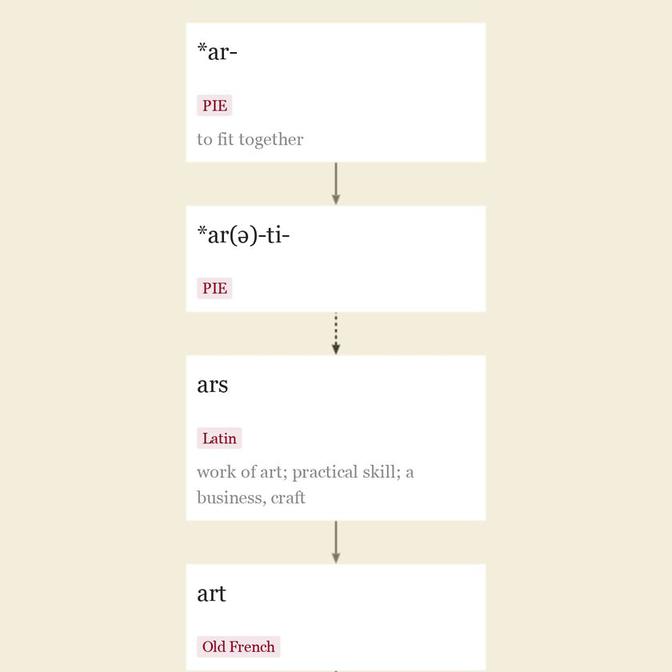artful (adj.)
1610s, "learned, well-versed in the (liberal) arts," also "characterized by technical skill, artistic," from art (n.) + -ful. The meaning "cunning, crafty, skilled in adapting means to ends" is from 1739. Related: Artfully; artfulness. The Artful Dodger (Jack Dawkins) is from Dickens' "Oliver Twist" (1837-39).
Entries linking to artful
early 13c., "skill as a result of learning or practice," from Old French art (10c.), from Latin artem (nominative ars) "work of art; practical skill; a business, craft," from PIE *ar(ə)-ti- (source also of Sanskrit rtih "manner, mode;" Greek artizein "to prepare"), suffixed form of root *ar- "to fit together." Etymologically akin to Latin arma "weapons" (see arm (n.2)).
In Middle English usually with a sense of "skill in scholarship and learning" (c. 1300), especially in the seven sciences, or liberal arts. This sense remains in Bachelor of Arts, etc. The meaning "human workmanship" (as opposed to nature) is from late 14c. The meaning "system of rules and traditions for performing certain actions" is from late 15c. The sense of "skill in cunning and trickery" is attested by late 16c. (the sense in artful, artless). The meaning "skill in creative arts" is recorded by 1610s; especially of painting, sculpture, etc., from 1660s.
In science you must not talk before you know. In art you must not talk before you do. In literature you must not talk before you think. [Ruskin, "The Eagle's Nest," 1872]
Supreme art is a traditional statement of certain heroic and religious truths, passed on from age to age, modified by individual genius, but never abandoned. The revolt of individualism came because the tradition had become degraded, or rather because a spurious copy had been accepted in its stead. [William Butler Yeats, journal, 1909]
Expression art for art's sake (1824) translates French l'art pour l'art. First record of art critic is from 1847. Arts and crafts "decorative design and handcraft" is from the Arts and Crafts Exhibition Society, founded in London in 1888.
"popular Italian or Italian-derived comedy involving stock characters," 1768, Italian, literally "comedy of art;" see comedy + art (n.). Arte here is likely meant in the sense of artful. The commedia dell'arte originally indicated only the improvised kind of formulaic comedy versus the scripted shows, but in 19c. the term came to designate all of the genre and related imagery (e.g. porcelain figurines of the characters being described as "commedia dell'arte characters"). The older term for this type of theatre in English is simply Italian Comedy.
word-forming element attached to nouns (and in modern English to verb stems) and meaning "full of, having, characterized by," also "amount or volume contained" (handful, bellyful); from Old English -full, -ful, which is full (adj.) become a suffix by being coalesced with a preceding noun, but originally a separate word. Cognate with German -voll, Old Norse -fullr, Danish -fuld. Most English -ful adjectives at one time or another had both passive ("full of x") and active ("causing x; full of occasion for x") senses.
It is rare in Old English and Middle English, where full was much more commonly attached at the head of a word (for example Old English fulbrecan "to violate," fulslean "to kill outright," fulripod "mature;" Middle English had ful-comen "attain (a state), realize (a truth)," ful-lasting "durability," ful-thriven "complete, perfect," etc.).
Trends of artful
More to Explore
updated on September 26, 2022
Dictionary entries near artful
arteriole
arteriosclerosis
artery
artesian
art-form
artful
arthralgia
arthritic
arthritis
arthro-
arthropod

